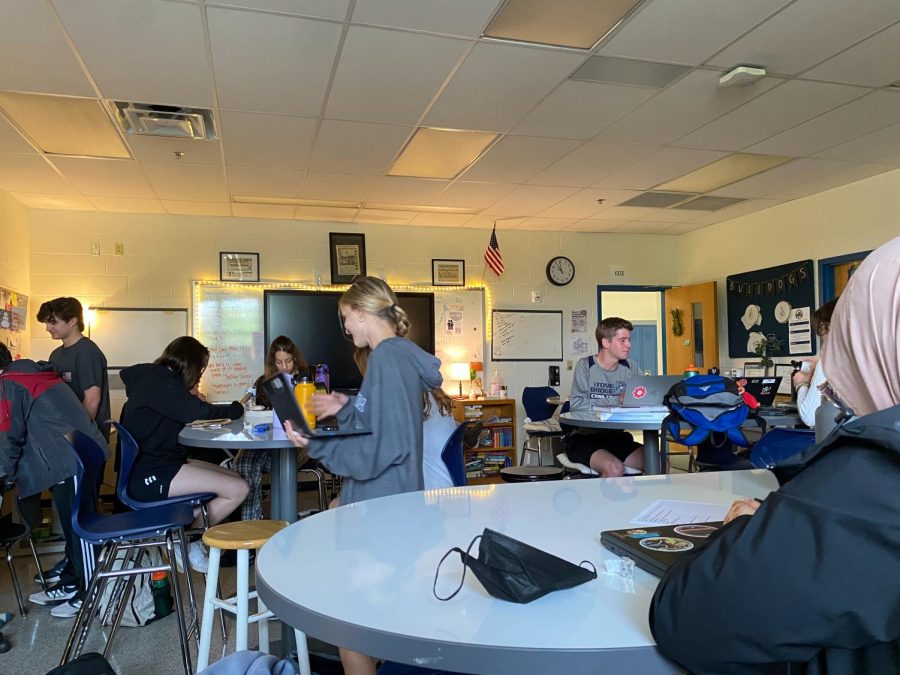Elective Enrollment
Redefine the Decline
From Architectural Drawing and Design to Gourmet Foods, Stone Bridge offers a host of elective courses each year. However, enrollment in most electives has declined, forcing some courses to combine with other electives or be omitted entirely.
Any course that falls outside of the required high school curriculum can be considered an elective. Electives span across a variety of disciplines and subject areas, including culinary arts, foreign language, Career and Technical Education (CTE), visual arts, music, theater arts, and business.
“An elective course–it’s meant to enrich a student’s high school experience,” Public Speaking and Creative Writing teacher Ms. Jessica Nastasi said. “It’s meant to be fun.”
In the 2021-2022 school year, Ms. Nastasi taught Public Speaking and Creative Writing as separate, semester-long courses. This year, however, the classes were combined into one due to the decrease in elective enrollment.
“What we can offer is based on the student enrollment,” Director of School Counseling Mr. R. Tim Lucas said. “Cyber Security, for example, has really expanded […] but ASL and Latin continually decline, which makes it tough because if you don’t have 15 or so kids in a class, it’s hard for us to make that work.”
Students are encouraged to take electives for many different reasons. For one, electives can create a needed break in a student’s schedule, as the courses tend to be less demanding than core or Advanced Placement (AP) / Dual Enrollment (DE) classes. This makes electives valuable in creating a manageable and invigorating course load.
“The biggest thing and hardest thing for kids is to maintain balance,” Mr. Lucas said. “There’s only so many hours in a day. So, when kids look at their course selections, they’re really looking at what is best for them and balancing their life.”
Another advantage to taking elective classes is the chance to explore personal interests. Electives often focus on a specific subject area, one that may cater to a student’s talents or interests.
“An elective is a place for you to pursue something you are very passionate about,” Ms. Nastasi said. “Electives can provide a place for you to shine and show off […] what you’re good at outside of core classes.”
Furthermore, the opportunity of trying something new or deepening the study of a personal passion can help students narrow down college and career plans.
“You never know what is going to spark an interest for you and going to lead you down a path that could be a career,” Mr. Lucas said.
Junior Eirini Syrtarioti, who enrolled in an elective during her busy third year, said that taking the Early Childhood Education course encouraged her to pursue a degree in elementary education.
“I really liked working with the kids, and learning the psychology behind [teaching] kids really pushed me to actually go and pursue education,” Syratori said.
With the many advantages of electives, one may wonder why enrollment has decreased. The answer could lie in the increasing value students put on their grade point average (GPA).
While some AP or DE classes, like Geospatial Science, are considered electives, most electives do not offer a 0.5 or 1.0 GPA boost like core honors or AP/DE classes do.
“We’re seeing more and more in the last couple of years that kids are really focused on their GPA,” Mr. Lucas said. “They’re trying to take the courses that are weighted. They’re looking at more honors classes, taking more Dual Enrollment classes that they can take to increase their GPA [and] potentially make them a stronger candidate for applying to college.”
Unfortunately, strictly focusing on GPA can sometimes weaken the sophistcation of an application in the eyes of admissions officers. Electives are one aspect of an application that can be extremely advantageous, as they often showcase characteristics like leadership, compassion, and creativity.
“Your GPA is important but colleges are looking for […] that well rounded person,” Mr. Lucas said.

Jillian Wallner is a senior, a returning writer at the "Bulldog Tribune", and involved in multiple groups at Stone Bridge, including PEER and the cross...


